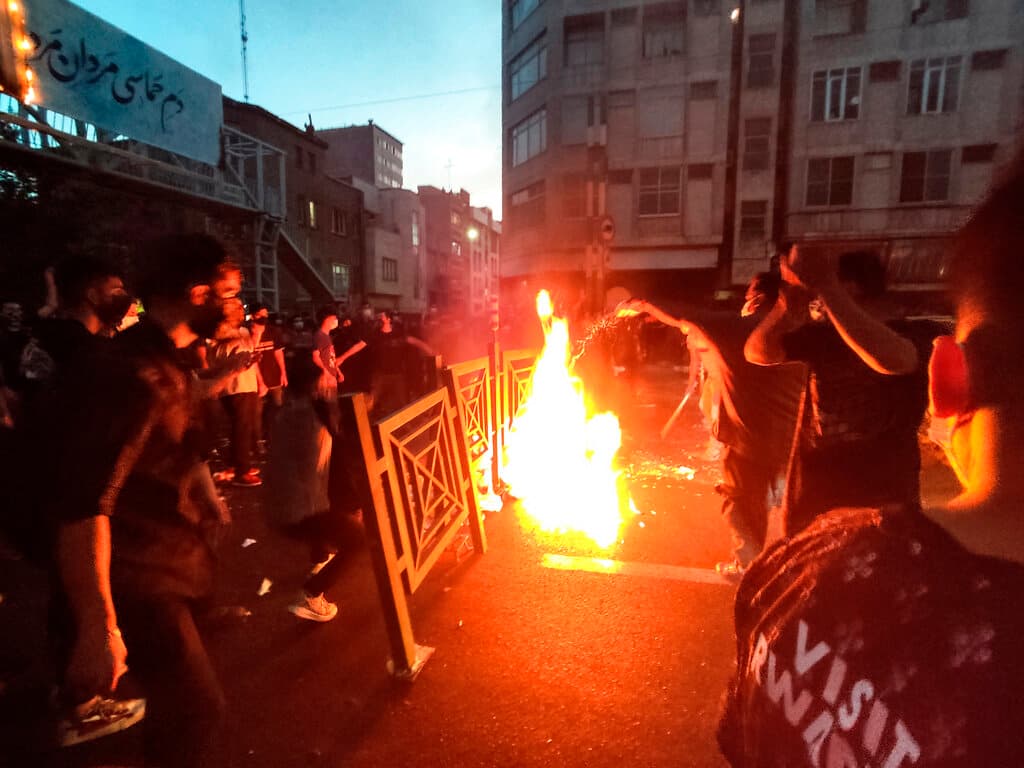Unrest Over War, Covid Spreading in Iran, Russia, and China
More than 50 cities and towns are affected in Iran alone, and the death toll is climbing.

While revisionist powers attempt to unite with a goal of overturning the American-led world order, their people are increasingly dissatisfied with the way they govern. Iran, Russia, and Communist China’s oppressive measures are triggering unrest.
In Iran, violence is rising as anti-government protests have hit more than 50 cities and towns in response to the death of a 22-year-old woman, Mahsa Amini, who violated hijab regulations. The death toll in clashes between police and protesters is climbing as regime opponents increasingly show no fear, physically attacking brutal law enforcers.
Protesters are openly demanding an end to the regime. The #IranRevolution hashtag is trending on Twitter. Videos show people chanting, “Mullahs get lost,” “We don’t want an Islamic republic,” and, “Death to the supreme leader.”
Police have reportedly attacked crowds of up to 1,000 people with tear gas and live bullets. The regime has amped up enforcement of restrictive women’s dress codes since President Raisi assumed power last year, which has exacerbated the unrest.
The authorities are interrupting internet services. Cellphone communication, WhatsApp, and Instagram are now partially unavailable, according to an internet watchdog, NetBlocks. Local WhatsApp users can now only send texts, not images or videos.
Iran’s minister of information and communications, Issa Zarepour, said restrictions on internet speed in certain areas are imposed for “security reasons.”
On day six of the unrest, violent protests spread across the country. Protesters now chase down security forces with rocks in hand. At Isfahan and Tehran, protesters are setting police cars on fire, and at Kerman they cornered a police officer and kicked him to the ground. The Associated Press reported that Iranian state TV suggested the death toll tied to the unrest could be as high as 26.
In Mr. Raisi’s United Nations address Wednesday, the protest went unmentioned. Yet, he criticized Western countries for reacting to “an incident under investigation in Iran.” Speaking to reporters Thursday, he said that the unrest shows that Iran has freedom of expression.
Meanwhile in Russia, more than 1,300 people were detained Wednesday for participating in anti-war protests following President Putin’s announcement of a “partial mobilization” to beef up troops in Ukraine.
According to the defense minister, Sergei Shoigu, up to 300,000 reservists could be drafted. This follows major Russian setbacks in the Ukraine war. Kyiv has recaptured thousands of square miles of its territory.
In announcing Russia’s first military draft since World War II, Mr. Putin said the measure is necessary to “protect our homeland, its sovereignty, and its territorial integrity.”
The public is unconvinced. Videos on social media have shown large protests in Russia, with people chanting, “No to war. No to mobilization,” and, “Our husbands, fathers, and brothers do not want to kill other husbands and fathers.”
According to a protest-monitoring group, OVD-Info, more than 1,311 people have been detained in 38 Russian cities for violating Russia’s anti-protest laws. These include 502 people from Moscow and 524 at St. Petersburg.
On Wednesday, the Moscow prosecutor’s office warned citizens that they could face up to 15 years in jail if they join protests.
Following Mr. Putin’s announcement on Wednesday, Google Trends data showed an increase in searches for Russia’s flight-booking site, Aviasales. Flights from Moscow to Istanbul, Turkey, and Yeveran, Armenia — the only two places where sanctions do not restrict travel from Russia — were sold out Wednesday.
Communist China doesn’t fare much better. A bus accident that killed 27 people who were being transferred to a Covid quarantine facility on Sunday has triggered major online protests against the government’s zero-Covid policies.
An article headlined, “Evil is prevalent because we obey unconditionally” has been widely shared on social media, along with comments like, “We’re on that bus, too.”
Imposed earlier this year amid the rise of cases in the country, Beijing’s zero-Covid policy is shutting down entire cities. People are locked in their apartments, travel is restricted, and entering public places requires a contact-tracing app.
The Peterson Institute for International Economics reports that the economy shrank by 2.6 percent and is at its worst point since 2020. Unemployment is at a record 19.3 percent.
Shanghai residents said they were unable to get medicines or groceries during the city’s two-month lockdown earlier this year. Last week Xinjiang residents said they ran out of food after 40 days of lockdown.
As yet there are no signs that Beijing plans to overturn its zero-Covid policies anytime soon. The longer they last, the louder the protests are likely to be.
While Beijing, Moscow, and Tehran try new ways of putting down insurrection, unrest is spreading and powers that were once considered safely above the fray seem more vulnerable than ever.

